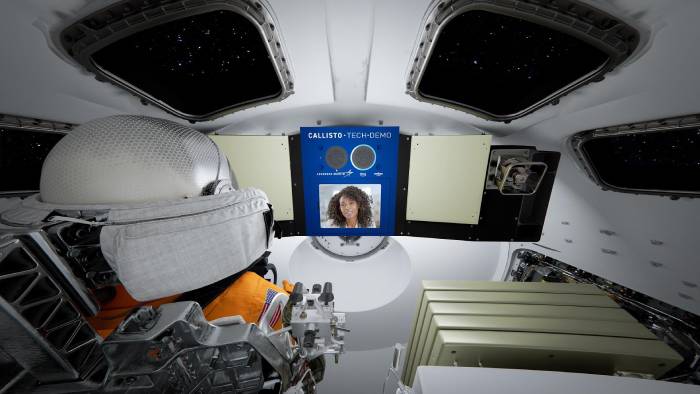The Artemis 1 mission, which might launch as early as March, will send an Orion spacecraft around the moon. The cabin will be mostly empty, with the exception of an interactive tablet dubbed “Callisto,” which will be propped up in front of an astronaut mannequin. Callisto is a touch-screen gadget with redesigned versions of Alexa, Amazon’s voice assistant, and Cisco’s WebEx teleconferencing platform.
How the virtual assistant functions in space is one of the many elements that will be meticulously monitored on the ground — at least by the organisation behind this Alexa project. At the very least, there will be some well-placed advertising.
It’s all part of a partnership between Amazon (AMZN), Cisco (CSCO), and Lockheed Martin (LMT), the company that constructed NASA’s Orion spacecraft. According to the companies, Lockheed approached the other two companies around three years ago with the concept of establishing a virtual assistant, and they are covering the complete cost of including the virtual assistant on the Artemis 1 mission. Lockheed is also compensating NASA for any assistance it provided on this project through a Space Act Agreement, which authorises NASA to be compensated for expertise or resources it provides to companies working on specific space-related projects.
When the Space Act Agreement for this project was signed in 2018, the expected expenses were around $2.1 million, according to a Lockheed representative, though Lockheed ultimately paid NASA nearly $3 million.
According to report, NASA was not involved in the design of the system or the selection of the Lockheed partners.
“Lockheed is leading the effort and we’re happy to enable that in terms of providing a platform, just like we would do with other technology demonstrations that we think could hold future benefits,” Howard Hu, NASA’s Orion Deputy Program Manager says.
The technology, named Callisto after a Greek mythological companion of the goddess Artemis, intends to make astronauts’ tasks easier one day. According to the corporations, they could use Alexa to change the cabin illumination while doing other things, or they could utilise WebEx to connect with loved ones back on Earth to make long, difficult journeys through space more joyful.
“[We] envision a future in which astronauts could turn to an onboard artificial intelligence, for information and for assistance and ultimately for companionship,” said Aaron Rubenson, vice president of Amazon’s Alexa programme.
Callisto, on the other hand, is yet to arrive. Callisto has only been approved for use on Artemis 1 so far, and not for any future crewed Artemis missions.
The space agency is “evaluating all kinds of technology” and “looking at various ways to enable the astronauts to operate the vehicle more efficiently,” Hu, the Orion deputy programme manager says.
“Certainly virtual assistants or assistants and AI will be part of that evaluation [for future missions] — whatever they may be, whether it’s Callisto or something else,” Hu stated.
Questions that need to be answered
The businesses behind Callisto say that the system has been thoroughly tested on the ground, but there are still many unknowns regarding how it will work. And it’s unclear if future astronauts will see it as a useful tool. According to the firms, no Artemis astronauts have yet tested the device, even on the ground.
It’s unknown how effectively the WebEx conferencing technology will operate, for example. It’s worth noting that astronauts have always been able to speak with people on the ground through existing communication methods. A video conference with astronauts on the International Space Station, for example, is currently conceivable. Making contact with a hypersonic spacecraft more than two hundred thousand miles away from Earth, on the other hand, is difficult and, at times, impossible.
Cisco, on the other hand, thinks that WebEx will improve astronauts’ ability to interact and coordinate with people on the ground, and that it will be used to set up multi-person meetings and conferences. That is, if a suitable connection can be made.
Alexa faces difficulties as a result of shaky internet connectivity. To process inquiries and obtain information, Amazon smart speaker devices in people’s homes require an internet connection. However, Rubenson said that while the version of Alexa used for the Callisto system has been reconfigured to work largely offline — theoretically capable of giving future astronauts live updates on their flight trajectory, for example — the system would still require a connection if astronauts wanted up-to-date information on Earthly happenings.
Alexa will have access to real-time telemetry data and will be able to answer queries concerning the voyage, including as the capsule’s speed. Only one component of the Artemis 1 flight will be controlled by the AI: the cabin illumination. The Callisto team, on the other hand, envisions a future in which the system can be customised to operate additional hardware, such as cameras.
In the event that everything else fails, the mission will provide Amazon with some strategic product placement. NASA has promoted commercial use of space as one of its key priorities for more than a decade. And this endeavour has some of the trappings of a business public relations campaign.
For consumers who have an Alexa-enabled device at home, for example, Amazon is releasing a new feature. Users will be able to get live information on the Artemis 1 mission by saying “Alexa, take me to the Moon.”
“We want to use Alexa’s role in this mission to to raise awareness of space and…ultimately to inspire the next generation of enthusiasts and engineers,” Rubenson added.
Regardless of whether Callisto proves to be valuable for future missions or not, it will have accomplished one aim. “It is a very photogenic payload,” said Rob Chambers, head of commercial civil space strategy at Lockheed Martin.
- World Meditation Day 2024: The Emotional Growth Benefits of Mindfulness for Kids - December 21, 2024
- Bryson DeChambeau will make international history in his first tournament of the year - December 21, 2024
- Disney’s ‘Mufasa: The Lion King’: Who Is the Voice of the Legendary King? - December 21, 2024





